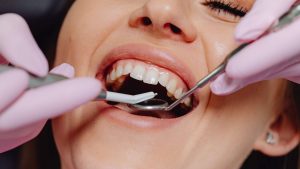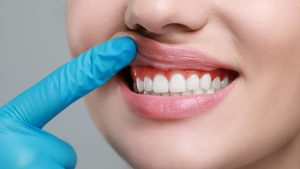Stress can wrap around your oral health like a tight coil, squeezing out potential issues you might not notice until it’s too late. For example, you may find yourself clenching your jaw or grinding your teeth, symptoms often overlooked in the hustle of daily life. These habits can lead to more serious concerns, such as TMJ disorders or even tooth damage.
But stress doesn’t stop there—it can dry up your mouth, making it a breeding ground for decay and gum disease. Are you curious about how stress can further sneak up on your smile? There’s more to uncover.
1. Clenched Jaws and TMJD
Frequently, stress manifests physically through muscle tension, often leading to clenched jaws. You might experience this as a tightness that disrupts your daily life.
Explore jaw relaxation techniques and adopt effective stress management strategies to alleviate this. These approaches can significantly ease tension and restore normal jaw function.
If you suspect TMJD, consider various treatment options, including physical therapy and medication. A mouthguard can prevent further damage to your teeth and jaw by providing a cushion against grinding.
Incorporating jaw exercise routines into your daily life can also enhance flexibility and reduce pain. Addressing the root causes and adopting these practices can alleviate discomfort and maintain your oral health.
2. Teeth Grinding Effects
Teeth grinding, often referred to as bruxism, can silently wreak havoc on your dental health, especially when it occurs during sleep.
You mightn’t even realize you’re doing it until you experience bruxism symptoms like jaw soreness, headaches, or tooth sensitivity. This nighttime habit can wear down enamel and lead to cracked teeth.
Thankfully, effective dental treatments are available to address these issues. Oral appliances, such as night guards, can protect teeth from further damage.
Additionally, focusing on stress management techniques can help reduce the frequency of grinding. By identifying and modifying nighttime habits, you can mitigate the harmful effects of bruxism and preserve your oral health.
Consult your dentist to explore tailored solutions for your needs.
3. Stress-Induced Dry Mouth
In addition to teeth grinding, stress can affect oral health by reducing saliva production, leading to dry mouth.
When you’re stressed, your body might not produce enough saliva, making your mouth feel dry and uncomfortable. This can increase your risk of tooth decay and gum disease.
To combat this, focus on stress relief and anxiety management techniques like deep breathing or yoga. Incorporate hydration strategies by drinking plenty of water throughout the day.
Consider using saliva substitutes available at pharmacies to help maintain moisture. Don’t forget your oral care routine; brushing and flossing regularly can help protect your teeth and gums.
Managing stress effectively is crucial for maintaining mental and oral health.
4. Canker Sores and Stress
The interplay between stress and oral health often manifests as canker sores, those small yet painful lesions that can suddenly appear in your mouth.
Stress can be a major trigger for canker sores because it weakens the immune system, making the body more susceptible to these unwelcome visitors. When you’re stressed, your body’s defenses are down, allowing canker sores to develop more easily.
Consider various remedies like topical treatments or mouth rinses to aid in healing. Additionally, don’t underestimate the impact of nutrition; a diet lacking essential nutrients can hinder your recovery.
Incorporating stress management techniques such as meditation or exercise can also help reduce the frequency of outbreaks. Maintaining a balanced lifestyle is key to minimizing these stress-induced oral issues.
5. Gum Infection Risks
While canker sores are a common stress-related oral issue, it’s also important to consider how stress impacts your gums.
Stress can weaken the immune system, making people more susceptible to gum infections. Chronic stress elevates cortisol levels, leading to oral inflammation, which, if left unchecked, can progress to conditions like gingivitis or periodontitis.
This highlights the importance of stress management for maintaining gum health.
To reduce gum infection risks:
Regular dental check-ups: They help monitor your gum health and catch issues early.
Stress management techniques: Practices like meditation or exercise can boost your immune response.
Consistent oral hygiene: Brushing and flossing regularly can prevent oral inflammation and infection.
Taking these steps can help protect your gums from the negative effects of stress.
6. Tooth Decay Factors
When stress infiltrates your life, it can lead to behaviors that significantly contribute to tooth decay. You might notice changes in your dietary habits, often reaching for sugary snacks. Increased sugar consumption feeds harmful oral bacteria, which thrive and produce acids that attack your teeth, causing enamel erosion.
This process weakens teeth, making them more susceptible to cavities. Stress can also compromise the immune response, reducing the body’s ability to fight off these bacteria effectively. As your immune defenses falter, the risk of tooth decay escalates.
Mindful dietary choices and stress management can help protect teeth. Prioritizing foods low in sugar and maintaining a balanced diet will also support oral health.
7. Impact on Dental Hygiene
Stress can wreak havoc on your dental hygiene practices, leading to neglect and poor oral health. When life’s pressures mount, you might skip brushing or flossing, allowing plaque to build up.
Dental neglect can result in inflammation, cavities, and gum disease. It can also affect the immune system, making it harder to fight off oral infections. However, you can protect your oral hygiene and overall well-being by adopting healthy habits and prioritizing stress management.
Consider these tips to maintain your dental health during stressful times:
Stick to a Routine: Consistency in brushing and flossing helps ward off decay.
Practice Relaxation Techniques: Stress management reduces the risk of dental neglect.
Stay Hydrated: Drinking water supports saliva production, which is crucial for a healthy mouth.
Revitalize Your Smile with Hand Family Dentistry
In the intricate cityscape of your oral health, navigating stress and maintaining a radiant smile requires expert guidance and care.
At Hand Family Dentistry, we offer a comprehensive range of general and cosmetic dental services to ensure your oral health thrives even amidst life’s inevitable storms. Our skilled team, equipped with the latest dental technology and a compassionate approach, is dedicated to providing personalized care tailored to your unique needs.
From routine check-ups and cleanings to transformative cosmetic procedures, Hand Family Dentistry is your partner in achieving optimal oral health and a smile that lights up your world.
Trust in our expertise to help you embrace stress management and maintain impeccable oral hygiene, keeping your dental city vibrant and resilient.
Visit us today and experience the difference of exceptional dental care focused on your well-being.


